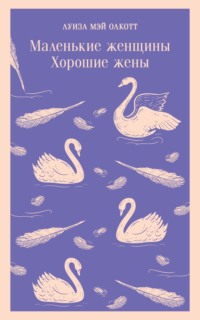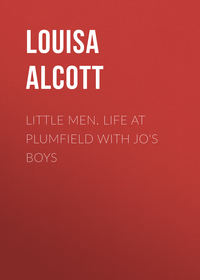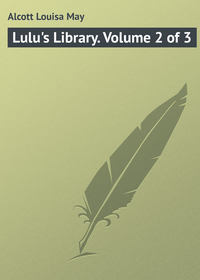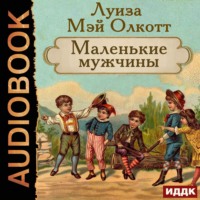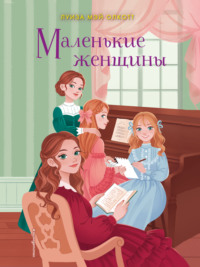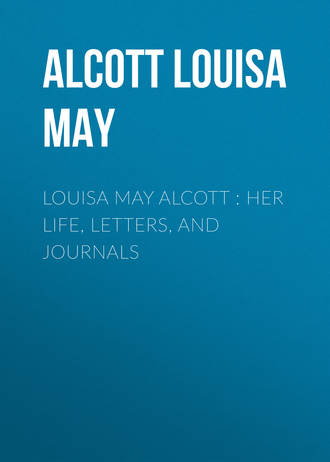 полная версия
полная версияLouisa May Alcott : Her Life, Letters, and Journals

Louisa May Alcott
Louisa May Alcott : Her Life, Letters, and Journals
LOUISA MAY ALCOTT is universally recognized as the greatest and most popular story-teller for children in her generation. She has known the way to the hearts of young people, not only in her own class, or even country, but in every condition of life, and in many foreign lands. Plato says, "Beware of those who teach fables to children;" and it is impossible to estimate the influence which the popular writer of fiction has over the audience he wins to listen to his tales. The preacher, the teacher, the didactic writer find their audience in hours of strength, with critical faculties all alive, to question their propositions and refute their arguments. The novelist comes to us in the intervals of recreation and relaxation, and by his seductive powers of imagination and sentiment takes possession of the fancy and the heart before judgment and reason are aroused to defend the citadel. It well becomes us, then, who would guard young minds from subtle temptations, to study the character of those works which charm and delight the children.
Of no author can it be more truly said than of Louisa Alcott that her works are a revelation of herself. She rarely sought for the material of her stories in old chronicles, or foreign adventures. Her capital was her own life and experiences and those of others directly about her; and her own well-remembered girlish frolics and fancies were sure to find responsive enjoyment in the minds of other girls.
It is therefore impossible to understand Miss Alcott's works fully without a knowledge of her own life and experiences. By inheritance and education she had rich and peculiar gifts; and her life was one of rare advantages, as well as of trying difficulties. Herself of the most true and frank nature, she has given us the opportunity of knowing her without disguise; and it is thus that I shall try to portray her, showing what influences acted upon her through life, and how faithfully and fully she performed whatever duties circumstances laid upon her. Fortunately I can let her speak mainly for herself.
Miss Alcott revised her journals at different times during her later life, striking out what was too personal for other eyes than her own, and destroying a great deal which would doubtless have proved very interesting.
The small number of letters given will undoubtedly be a disappointment. Miss Alcott wished to have most of her letters destroyed, and her sister respected her wishes. She was not a voluminous correspondent; she did not encourage many intimacies, and she seldom wrote letters except to her family, unless in reference to some purpose she had strongly at heart. Writing was her constant occupation, and she was not tempted to indulge in it as a recreation. Her letters are brief, and strictly to the point, but always characteristic in feeling and expression; and, even at the risk of the repetition of matter contained in her journals or her books, I shall give copious extracts from such as have come into my hands.
E. D. C.Jamaica Plain, Mass., 1889.
CHAPTER I
GENEALOGY AND PARENTAGE
TO LOUISA MAY ALCOTTBY HER FATHERWhen I remember with what buoyant heart,Midst war's alarms and woes of civil strife,In youthful eagerness thou didst depart,At peril of thy safety, peace, and life,To nurse the wounded soldier, swathe the dead,–How piercèd soon by fever's poisoned dart,And brought unconscious home, with wildered head,Thou ever since 'mid langour and dull pain,To conquer fortune, cherish kindred dear,Hast with grave studies vexed a sprightly brain,In myriad households kindled love and cheer,Ne'er from thyself by Fame's loud trump beguiled,Sounding in this and the farther hemisphere,–I press thee to my heart as Duty's faithful child.LOUISA ALCOTT was the second child of Amos Bronson and Abba May Alcott. This name was spelled Alcocke in English history. About 1616 a coat-of-arms was granted to Thomas Alcocke of Silbertoft, in the county of Leicester. The device represents three cocks, emblematic of watchfulness; and the motto is Semper Vigilans.
The first of the name appearing in English history is John Alcocke of Beverley, Yorkshire, of whom Fuller gives an account in his Worthies of England.
Thomas and George Alcocke were the first of the name among the settlers in New England. The name is frequently found in the records of Dorchester and Roxbury, and has passed through successive changes to its present form.
The name of Bronson came from Mr. Alcott's maternal grandfather, the sturdy Capt. Amos Bronson of Plymouth, Conn. "His ancestors on both sides had been substantial people of respectable position in England, and were connected with the founders and governors of the chief New England colonies. At the time of Mr. Alcott's birth they had become simple farmers, reaping a scanty living from their small farms in Connecticut."
Amos Bronson Alcott, the father of Louisa, was born Nov. 29, 1799, at the foot of Spindle Hill, in the region called New Connecticut. He has himself given in simple verse the story of his quaint rustic life in his boyhood, and Louisa has reproduced it in her story of "Eli's Education" (in the Spinning-Wheel Stories), which gives a very true account of his youthful life and adventures. He derived his refined, gentle nature from his mother, who had faith in her son, and who lived to see him the accomplished scholar he had vowed to become in his boyhood. Although brought up in these rustic surroundings, his manners were always those of a true gentleman. The name of the little mountain town afterward became Wolcott, and Louisa records in her journal a pilgrimage made thither in after years.1
Louisa Alcott's mother was a daughter of Col. Joseph May of Boston. This family is so well known that it is hardly necessary to repeat its genealogy here.2 She was a sister of Samuel J. May, for many years pastor of the Unitarian church at Syracuse, who was so tenderly beloved by men of all religious persuasions in his home, and so widely known and respected for his courage and zeal in the Antislavery cause, as well as for his many philanthropic labors.
Mrs. Alcott's mother was Dorothy Sewall, a descendant of that family already distinguished in the annals of the Massachusetts colony, and which has lost nothing of its reputation for ability and virtue in its latest representatives.3
Mrs. Alcott inherited in large measure the traits which distinguished her family. She was a woman of large stature, fine physique, and overflowing life. Her temper was as quick and warm as her affections, but she was full of broad unselfish generosity. Her untiring energies were constantly employed, not only for the benefit of her family, but for all around her. She had a fine mind, and if she did not have large opportunities for scholastic instruction, she always enjoyed the benefit of intellectual society and converse with noble minds. She loved expression in writing, and her letters are full of wit and humor, keen criticism, and noble moral sentiments. Marriage with an idealist, who had no means of support, brought her many trials and privations. She bore them heroically, never wavering in affection for her husband or in devotion to her children. If the quick, impatient temper sometimes relieved itself in hasty speech, the action was always large and unselfish.
It will be apparent from Louisa's life that she inherited the traits of both her parents, and that the uncommon powers of mind and heart that distinguished her were not accidental, but the accumulated result of the lives of generations of strong and noble men and women.
She was well born.
Mr. Alcott to Colonel MayGermantown, Nov. 29, 1832.Dear Sir,–It is with great pleasure that I announce to you the birth of a second daughter. She was born at half-past 12 this morning, on my birthday (33), and is a very fine healthful child, much more so than Anna was at birth,–has a fine foundation for health and energy of character. Abba is very comfortable, and will soon be restored to the discharge of those domestic and maternal duties in which she takes so much delight, and in the performance of which she furnishes so excellent a model for imitation. Those only who have seen her in those relations, much as there is in her general character to admire and esteem, can form a true estimate of her personal worth and uncommon devotion of heart. She was formed for domestic sentiment rather than the gaze and heartlessness of what is falsely called "society." Abba inclines to call the babe Louisa May,–a name to her full of every association connected with amiable benevolence and exalted worth. I hope its present possessor may rise to equal attainment, and deserve a place in the estimation of society.
With Abba's and Anna's and Louisa's regards, allow me to assure you of the sincerity with which I am
Yours,A. BronsonAlcott.The children who lived to maturity were–
Anna Bronson Alcott,Louisa May Alcott,Elizabeth Sewall Alcott,Abba May AlcottCHAPTER II
CHILDHOOD
TO THE FIRST ROBIN.4Welcome, welcome, little stranger,Fear no harm, and fear no danger;We are glad to see you here,For you sing "Sweet Spring is near."Now the white snow melts away;Now the flowers blossom gay:Come dear bird and build your nest,For we love our robin best.Louisa May Alcott.Concord.
MR. ALCOTT had removed to Germantown, Penn, to take charge of a school, and here Louisa was born, Nov. 29, 1832. She was the second daughter, and was welcomed with the same pride and affection as her elder sister had been. We have this pleasant little glimpse of her when she was hardly a month old, from the pen of one of her mother's friends. Even at that extremely early age love saw the signs of more than usual intelligence, and friends as well as fond parents looked forward to a promising career.
Extract from a Letter by Miss DonaldsonGermantown, Penn., Dec. 16, 1832.I have a dear little pet in Mrs. Alcott's little Louisa. It is the prettiest, best little thing in the world. You will wonder to hear me call anything so young pretty, but it is really so in an uncommon degree; it has a fair complexion, dark bright eyes, long dark hair, a high forehead, and altogether a countenance of more than usual intelligence.
The mother is such a delightful woman that it is a cordial to my heart whenever I go to see her. I went in to see her for a few moments the evening we received your letter, and I think I never saw her in better spirits; and truly, if goodness and integrity can insure felicity, she deserves to be happy.
The earliest anecdote remembered of Louisa is this: When the family went from Philadelphia to Boston by steamer, the two little girls were nicely dressed in clean nankeen frocks for the voyage; but they had not been long on board before the lively Louisa was missing, and after a long search she was brought up from the engine-room, where her eager curiosity had carried her, and where she was having a beautiful time, with "plenty of dirt."
The family removed to Boston in 1834, and Mr. Alcott opened his famous school in Masonic Temple. Louisa was too young to attend the school except as an occasional visitor; but she found plenty of interest and amusement for herself in playing on the Common, making friends with every child she met, and on one occasion falling into the Frog Pond. She has given a very lively picture of this period of her life in "Poppy's Pranks," that vivacious young person being a picture of herself, not at all exaggerated.
The family lived successively in Front Street, Cottage Place, and Beach Street during the six succeeding years in Boston. They occasionally passed some weeks at Scituate during the summer, which the children heartily enjoyed.
Mrs. Hawthorne gives a little anecdote which shows how the child's heart was blossoming in this family sunshine: "One morning in Front Street, at the breakfast table, Louisa suddenly broke silence, with a sunny smile saying, 'I love everybody in dis whole world.'"
Two children were born during this residence in Boston. Elizabeth was named for Mr. Alcott's assistant in his school,–Miss E. P. Peabody, since so widely known and beloved by all friends of education. A boy was born only to die. The little body was laid reverently away in the lot of Colonel May in the old burial-ground on the Common, and the children were taught to speak with tenderness of their "baby brother."
When Louisa was about seven years old she made a visit to friends in Providence. Miss C. writes of her: "She is a beautiful little girl to look upon, and I love her affectionate manners. I think she is more like her mother than either of the others." As is usually the case, Louisa's journal, which she began at this early age, speaks more fully of her struggles and difficulties than of the bright, sunny moods which made her attractive. A little letter carefully printed and sent home during this visit is preserved. In it she says she is not happy; and she did have one trying experience there, to which she refers in "My Boys." Seeing some poor children who she thought were hungry, she took food from the house without asking permission, and carried it to them, and was afterward very much astonished and grieved at being reprimanded instead of praised for the deed. Miss C. says: "She has had several spells of feeling sad; but a walk or a talk soon dispels all gloom. She was half moody when she wrote her letter; but now she is gay as a lark. She loves to play out of doors, and sometimes she is not inclined to stay in when it is unpleasant." In her sketches of "My Boys" she describes two of her companions here, not forgetting the kindness of the one and the mischievousness of the other.
Although the family were quite comfortable during the time of Mr. Alcott's teaching in Boston, yet the children wearied of their extremely simple diet of plain boiled rice without sugar, and graham meal without butter or molasses. An old friend who could not eat the bountiful rations provided for her at the United States Hotel, used to save her piece of pie or cake for the Alcott children. Louisa often took it home to the others in a bandbox which she brought for the purpose.
This friend was absent in Europe many years, and returned to find the name of Louisa Alcott famous. When she met the authoress on the street she was eagerly greeted. "Why, I did not think you would remember me!" said the old lady. "Do you think I shall ever forget that bandbox?" was the instant reply.
In 1840, Mr. Alcott's school having proved unsuccessful, the family removed to Concord, Mass., and took a cottage which is described in "Little Women" as "Meg's first home," although Anna never lived there after her marriage. It was a pleasant house, with a garden full of trees, and best of all a large barn, in which the children could have free range and act out all the plays with which their little heads were teeming. Of course it was a delightful change from the city for the children, and here they passed two very happy years, for they were too young to understand the cares which pressed upon the hearts of their parents. Life was full of interest. One cold morning they found in the garden a little half-starved bird; and having warmed and fed it, Louisa was inspired to write a pretty poem to "The Robin." The fond mother was so delighted that she said to her, "You will grow up a Shakspeare!" From the lessons of her father she had formed the habit of writing freely, but this is the first recorded instance of her attempting to express her feelings in verse.
From the influences of such parentage as I have described, the family life in which Louisa was brought up became wholly unique.
If the father had to give up his cherished projects of a school modelled after his ideas, he could at least conduct the education of his own children; and he did so with the most tender devotion. Even when they were infants he took a great deal of personal care of them, and loved to put the little ones to bed and use the "children's hour" to instil into their hearts lessons of love and wisdom. He was full of fun too, and would lie on the floor and frolic with them, making compasses of his long legs with which to draw letters and diagrams. No shade of fear mingled with the children's reverent recognition of his superior spiritual life. So their hearts lay open to him, and he was able to help them in their troubles.
He taught them much by writing; and we have many specimens of their lists of words to be spelled, written, and understood. The lessons at Scituate were often in the garden, and their father always drew their attention to Nature and her beautiful forms and meanings. Little symbolical pictures helped to illustrate his lessons, and he sometimes made drawings himself. Here is an example of lessons. A quaint little picture represents one child playing on a harp, another drawing an arrow. It is inscribed–
FOR LOUISA1840Two passions strong divide our life,–Meek, gentle love, or boisterous strife.Below the child playing the harp is–
Love, Music,ConcordBelow the shooter is–
Anger, Arrow,DiscordAnother leaflet is–
FOR LOUISA1840Louisa loves–What?(Softly.)FunHave some then,FathersaysChristmas Eve, December, 1840ConcordiaFOR ANNA1840Beauty or Duty,–whichloves Anna best?AQuestionfrom herFatherChristmas Eve,December, 1840ConcordiaA letter beautifully printed by her father for Louisa (1839) speaks to her of conscience, and she adds to it this note: "L. began early, it seems, to wrestle with her conscience." The children were always required to keep their journals regularly, and although these were open to the inspection of father and mother, they were very frank, and really recorded their struggles and desires. The mother had the habit of writing little notes to the children when she wished to call their attention to any fault or peculiarity. Louisa preserved many of them, headed,–
[Extracts from letters from Mother, received during these early years. I preserve them to show the ever tender, watchful help she gave to the child who caused her the most anxiety, yet seemed to be the nearest to her heart till the end.–L. M. A.]
No. 1.–My Dear Little Girl,–Will you accept this doll from me on your seventh birthday? She will be a quiet playmate for my active Louisa for seven years more. Be a kind mamma, and love her for my sake.
Your Mother.Beach Street, Boston, 1839.
From her MotherCottage in Concord.Dear Daughter,–Your tenth birthday has arrived. May it be a happy one, and on each returning birthday may you feel new strength and resolution to be gentle with sisters, obedient to parents, loving to every one, and happy in yourself.
I give you the pencil-case I promised, for I have observed that you are fond of writing, and wish to encourage the habit.
Go on trying, dear, and each day it will be easier to be and do good. You must help yourself, for the cause of your little troubles is in yourself; and patience and courage age only will make you what mother prays to see you,–her good and happy girl.
Concord, 1843.Dear Louy,–I enclose a picture for you which I always liked very much, for I imagined that you might be just such an industrious daughter and I such a feeble but loving mother, looking to your labor for my daily bread.
Keep it for my sake and your own, for you and I always liked to be grouped together.
Mother.The lines I wrote under the picture in my journal:–
TO MOTHERI hope that soon, dear mother,You and I may beIn the quiet room my fancyHas so often made for thee,–The pleasant, sunny chamber,The cushioned easy-chair,The book laid for your reading,The vase of flowers fair;The desk beside the windowWhere the sun shines warm and bright:And there in ease and quietThe promised book you write;While I sit close beside you,Content at last to seeThat you can rest, dear mother,And I can cherish thee.[The dream came true, and for the last ten years of her life Marmee sat in peace, with every wish granted, even to the "grouping together;" for she died in my arms.–L. M. A.]
A passage in Louisa's story of "Little Men" (p. 268) describes one of their childish plays. They "made believe" their minds were little round rooms in which the soul lived, and in which good or bad things were preserved. This play was never forgotten in after life, and the girls often looked into their little rooms for comfort or guidance in trial or temptation.
Louisa was very fond of animals, as is abundantly shown in her stories. She never had the happiness of owning many pets, except cats, and these were the delight of the household. The children played all manner of plays with them, tended them in sickness, buried them with funeral honors, and Louisa has embalmed their memory in the story of "The Seven Black Cats" in "Aunt Jo's Scrap-Bag."
Dolls were an equal source of pleasure. The imaginative children hardly recognized them as manufactured articles, but endowed them with life and feeling. Louisa put her dolls through every experience of life; they were fed, educated, punished, rewarded, nursed, and even hung and buried, and then resurrected in her stories. The account of the "Sacrifice of the Dolls" to the exacting Kitty Mouse in "Little Men" delights all children by its mixture of pathetic earnestness and playfulness. It is taken from the experience of another family of children.
Miss Alcott twice says that she never went to any school but her father's; but there were some slight exceptions to this rule. She went a few months to a little district school in Still River Village. This was a genuine old-fashioned school, from which she took the hint of the frolics in "Under the Lilacs." Miss Ford also kept a little school in Mr. Emerson's barn, to which the children went; and Mary Russell had a school, which Louisa attended when eight or nine years old. These circumstances, however, had small influence in her education.
During this period of life in Concord, which was so happy to the children, the mother's heart was full of anxious care. She however entered into all their childish pleasures, and her watchful care over their moral growth is shown by her letters and by Louisa's journals.
The youngest child, Abba May, who was born in the cottage, became the pet of the family and the special care of the oldest sister, Anna.
Louisa's childish journal gives us many hints of this happy life. She revised these journals in later years, adding significant comments which are full of interest. She designed them to have place in her autobiography, which she hoped to write.
From three different sources–her journals, an article written for publication, and a manuscript prepared for a friend,–we give her own account of these childish years. She has not followed the order of events strictly, and it has not been possible, therefore, to avoid all repetition; but they give the spirit of her early life, and clearly show the kind of education she received from her father and from the circumstances around her.
Sketch of Childhood, by herselfOne of my earliest recollections is of playing with books in my father's study,–building houses and bridges of the big dictionaries and diaries, looking at pictures, pretending to read, and scribbling on blank pages whenever pen or pencil could be found. Many of these first attempts at authorship still remain in Bacon's Essays, Plutarch's Lives, and other works of a serious nature, my infant taste being for solid literature, apparently.
On one occasion we built a high tower round baby Lizzie as she sat playing with her toys on the floor, and being attracted by something out-of-doors, forgot our little prisoner. A search was made, and patient baby at last discovered curled up and fast asleep in her dungeon cell, out of which she emerged so rosy and smiling after her nap that we were forgiven for our carelessness.
Another memory is of my fourth birthday, which was celebrated at my father's school-room in Masonic Temple. All the children were there. I wore a crown of flowers, and stood upon a table to dispense cakes to each child as the procession marched past. By some oversight the cakes fell short, and I saw that if I gave away the last one I should have none. As I was queen of the revel, I felt that I ought to have it, and held on to it tightly till my mother said,–
"It is always better to give away than to keep the nice things; so I know my Louy will not let the little friend go without."



